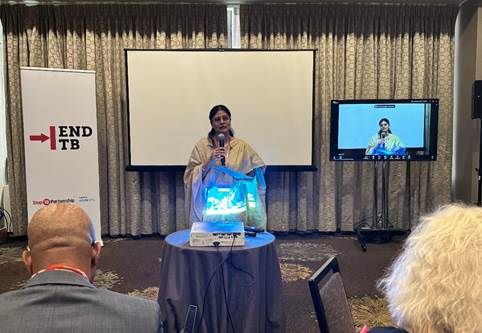She reiterated the nation's commitment to eliminating TB as a public health problem by 2030 and ensuring a healthier future for all

India is progressing against the Sustainable Development Goals (SDG) at a far greater pace than the global average, with a decline in TB incidence by 16% from 237 per hundred thousand population in 2015 to 199 in 2022 and a decline of 18% in TB deaths from 28 per hundred thousand population in 2015 to 23 in 2022 said Union Minister of State for Health and Family Welfare, Anupriya Patel delivering the keynote address at the “Interactive TB Vaccines Dialogue” event organized by STOP TB Partnerships on the sidelines of the ongoing 79th session of the United Nations General Assembly (UNGA) in New York City.
Delivering an affirming statement of global leadership during the Dialogue, Patel highlighted India's role as Chair of the Stop TB Partnership Board and reiterated the nation's commitment to eliminating TB as a public health problem by 2030 and ensuring a healthier future for all.
She further added that, “under the visionary leadership of Prime Minister Narendra Modi, India has made remarkable strides in TB care and prevention, from infrastructure expansion to financial support for patients”, referencing the National Strategic Plan that has significantly scaled up TB services nationwide. With over 7,767 molecular diagnostic laboratories, cutting-edge treatment protocols, and an 88% treatment success rate, India's TB program has become a model for the world. India initiated Nikshay Poshan Yojana in 2018 for providing US $6/month to support nutrition of TB patients for the entire duration of treatment. Cumulatively, till Aug 2024, NTEP has disbursed US $373 million to more than 10 million TB patients.”
Emphasizing the critical need for new vaccines, Patel stated that “TB has been the worst killer amongst all infectious diseases. While the childhood BCG vaccine has been essential in protecting children, its protective effects diminish with age” and “despite our advances, the world still loses millions of lives to TB. So, the time to invest in innovative vaccines is now."
Highlighting the “urgent need for an innovative and effective TB Vaccine”, Patel emphasized that “the unmet need for a TB Vaccine, and its potential role in TB elimination is where the world is focusing now” and “this forum represents a critical opportunity for us to come together, share knowledge, and accelerate the development of these life-saving vaccines. The past decades have witnessed a reawakening of novel vaccine approaches. Technical advances in molecular genetics and the design of viral vectors and adjuvants have facilitated TB vaccine development.”
She further added that “with around 16 vaccines having entered clinical trial assessments, the future of TB vaccine development looks considerably brighter than before.”
She highlighted India’s Research & Development (R&D) with recombinant BCG VPM1002 and Immuvac, the ongoing trial for evaluation of BCG revaccination in adults, and another trial in Phase IIb with novel vaccine MTBVAC ongoing among adults.
Underlining the importance of the Stop TB Partnership, Patel stated that, “the partnership is a beacon of collective strength and has evolved into a global force comprising over 2,000 partners from diverse sectors, all united in our resolve to eliminate TB as a public health problem by 2030.”
Offering to “share India’s experiences and capacities in the area”, Patel stated that, “as chair of the Stop TB Partnership Board, my call to action is to ensure that the world has at least one new and effective TB vaccine in the next one year”.
She concluded her address by urging the stakeholders to come together for “increased funding for TB Vaccine research; fostering global collaboration of governments, public and private institutions, and donors to ensure that “the vaccines are not only developed but also made available to people equitably, learning from the painful lessons of access to COVID vaccines.”

Subscribe To Our Newsletter & Stay Updated